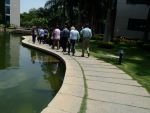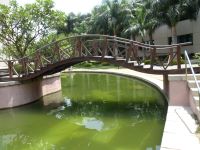I think we got a pretty good feel today of what it’s like to conduct business internationally. Our wake up call was at 4 am, so that we could be on the bus by 5 am to be at the airport at 6 am to take the 2 ½ hour flight to Bangalore to take a 1+ hour bus ride to Infosys for a tour of the facility and a presentation on the nature of the IT industry in the heartland of the IT industry in India….just like real business people do.
 The Infosys campus is one of those “islands of excellence in a sea of chaos” that one reads about in India. Going through security, one enters a campus that now contains 50 buildings, with 25,000 young people (the average age is 26, and the standard deviation appears to be +/- 2). The company hires around 25,000 well-educated employees a year, and offers training for 13,000 at a time on the 100 acre Mysore campus)
The Infosys campus is one of those “islands of excellence in a sea of chaos” that one reads about in India. Going through security, one enters a campus that now contains 50 buildings, with 25,000 young people (the average age is 26, and the standard deviation appears to be +/- 2). The company hires around 25,000 well-educated employees a year, and offers training for 13,000 at a time on the 100 acre Mysore campus)
Although there are 140,000 employees in 64 countries, the bulk of the top-end work, I believe, is done in Mysore. Though Infosys started in Business Process Outsourcing (it used to be call center), it has, like many of the Indian backroom companies, moved up the value chain. The man who spoke to us is part of a project team working with Boeing to develop lighter and fuel-efficient airplanes.
The campus is one of the most pleasant places in the work world; as they  explained, the facilities are geared toward a younger generation, but the buildings and setting are definitely world class. The company started with 7 men and a total of $250 in Pune (a city north of here), and gravitated to Bangalore because of its reputation as a center of scientific research, partly because in the Raj days it was one of the major air force encampments. That led to aerospace research, (a favorable state government helped), and as a result, most major multinationals, including the Indian ones, have some presence in Bangalore, usually in a gated community, many in the Electronic City (as is Infosys).
explained, the facilities are geared toward a younger generation, but the buildings and setting are definitely world class. The company started with 7 men and a total of $250 in Pune (a city north of here), and gravitated to Bangalore because of its reputation as a center of scientific research, partly because in the Raj days it was one of the major air force encampments. That led to aerospace research, (a favorable state government helped), and as a result, most major multinationals, including the Indian ones, have some presence in Bangalore, usually in a gated community, many in the Electronic City (as is Infosys).
When I asked about Corporate Social Responsibility, I got an interesting answer: the company has attempted to make itself sustainable (the recycled  river through it is the only place in India I’ve seen where I’d consider canoeing—or even touching!), with green buildings. It has also turned that focus into a for-profit unit, advising other countries on how they might handle the challenges of limited resources on a frail planet.
river through it is the only place in India I’ve seen where I’d consider canoeing—or even touching!), with green buildings. It has also turned that focus into a for-profit unit, advising other countries on how they might handle the challenges of limited resources on a frail planet.
Perhaps the most impressive feature was not just the rich culture we saw, but the confidence Infosys employees have in the future of India and their company. The company pioneered the Global Delivery Model, which was based on taking work to the location where it could be done best—most cheaply and most efficiently, and has become a 10$ b company. One of the founders of the company, Nandan Nilekani, you may recall from Friedman, “The World is Flat.” It was in Nilekani’s office that Friedman developed the idea that the world could be flat. It’s also a measure of the “India Way” that Nilekani, retired from the company, is heading up India’s efforts to create a unique identification system.
Although it was nice to have the rigor of doing international business (flying somewhere and getting off the plane and doing business), it was nice when we got the hotel around 5 p.m. and were able to have the night off. As I tell my students, they ought to admire people who do this regularly. Now they know why.